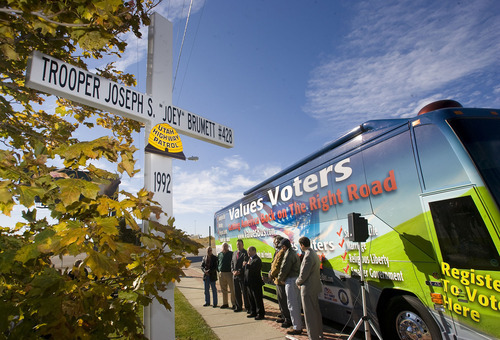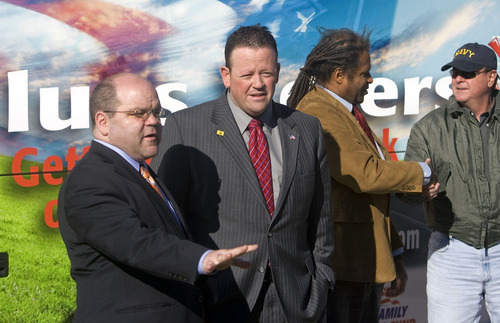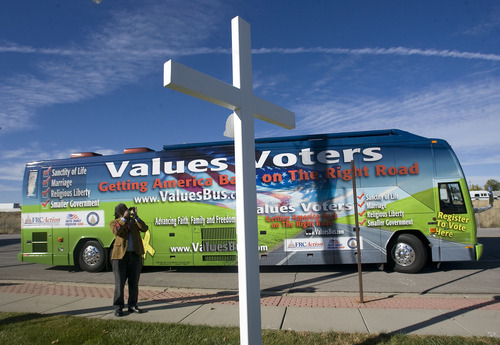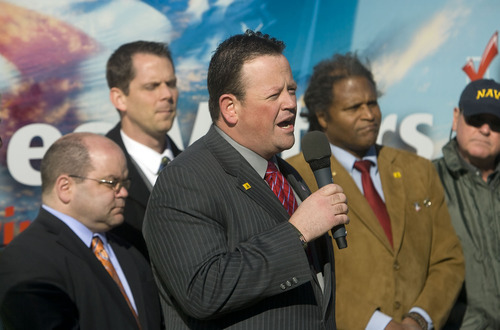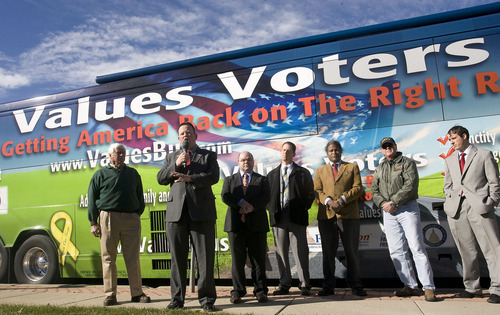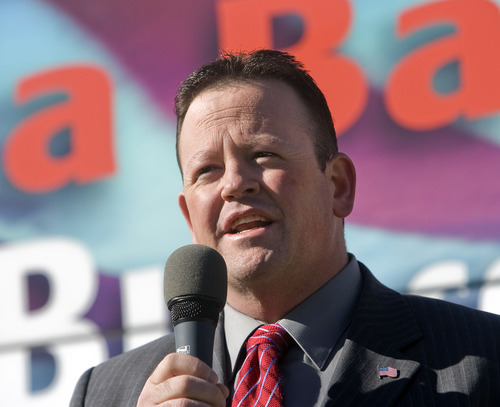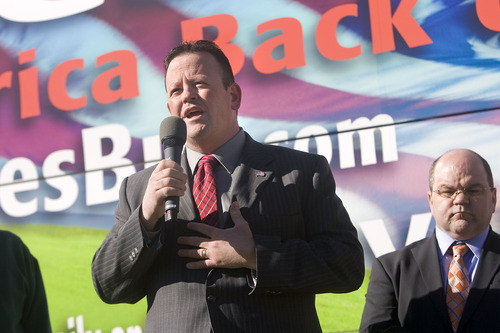This is an archived article that was published on sltrib.com in 2011, and information in the article may be outdated. It is provided only for personal research purposes and may not be reprinted.
Murray • The fight over a dozen white crosses memorializing fallen Utah State Troopers along Utah roadsides isn't over.
State Rep. Carl Wimmer, R-Herriman, vowed as much Thursday at a news conference with Tom McClusky, of the Family Research Council, a national conservative Christian group.
On Monday, the U.S. Supreme Court said it would not review the case of the Utah Highway Patrol Association vs. American Atheists. The 10th Circuit Court of Appeals had ruled in the contentious case that the 12-foot-high white crosses must be removed from public land and cannot bear the UHP insignia. In doing so, the court cited the First Amendment's establishment clause and the separation between religion and government.
Two of the crosses stand in front of a Highway Patrol Office in Murray.
Wimmer said he and other lawmakers are considering legislation that would keep the crosses where they are.
"I don't buy that this is about separation between church and state," he said. "This continued fight is about whether the state of Utah will allow atheists to have carte blanche authority."
Further, Wimmer said the crosses boiled down to a "sovereignty issue" and Utah has a right to memorialize troopers however it chooses, despite the federal courts.
One option, Wimmer said, would be to privatize the land on which the crosses stand. He said there may be other options, but did not elaborate.
The issue is not confined to Utah, according to McClusky, who said there will be other legal challenges coming from cases in other states. The Family Research Council is gathering signatures on a petition that will go to Congress, he said. McClusky's group is seeking both state and federal legislation that would allow crosses on public land.
He faulted the Supreme Court for not taking the Utah case and quoted dissenting Justice Clarence Thomas, who has written that various court rulings have worked to muddy the establishment clause.
"The lack of clarity is why we need this [U.S. Supreme] Court and the Legislature to address this," McClusky said.
Beyond that, McClusky said the federal courts have shown "disrespect" to the troopers and their families. "The court says tear them down at a time when we should give memorials to ease the families' loss."
Both men said the crosses are not a religious statement but are meant to memorialize troopers who died in the line of duty. They brushed aside suggestions that other kinds of memorials might be used.
The families of the slain troopers want crosses, rather than some other kind of memorial marker, Wimmer said. "We have to default to the families. The families are unified in having crosses."
Brian Barnard, the Salt Lake City-based attorney representing the American Atheists, agreed that the troopers should be honored, but not with a religious symbol.
"The memorials should not emphasize one religious faith to the exclusion of others," he said in a prepared statement. "A memorial symbol endorsed by the state should not be religious but should be universal."
Despite McClusky's assertion that the issue is a national one, Barnard said that while doing research for the lawsuit, he found no other law enforcement agency that used crosses for officers killed in the line of duty.
"Most agencies had memorials in one form or another for fallen officers, but none had large religious symbols," he said.
In an interview Thursday, Barnard said his client, the American Atheists, would fight any effort to sell off small pieces of land where the markers stand.
"There is no case law in the 10th Circuit for that kind of subterfuge," he said. "But that kind of maneuver has been attempted in other [jurisdictions] without success."
Barnard said if the crosses are not removed in a "reasonable amount of time," his client would seek redress.
What's next
P Now that the U.S. Supreme Court has declined to hear the cross case, the 10th Circuit Court of Appeals will order the federal court in Utah to set a timetable for the removal of the memorials in a "reasonable" amount of time, according to attorney Brian Barnard, who represented American Atheists in the litigation.


